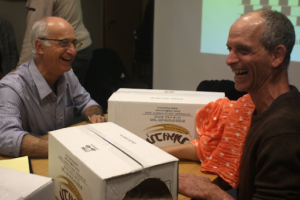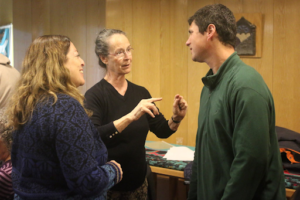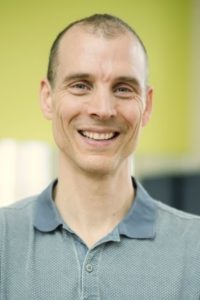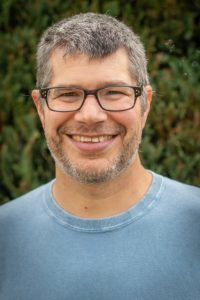Date/Time
Date(s) - Sat, 2nd Mar 2019 - Sun, 3rd Mar 2019
10:00 AM till 5:00 PM
Location
Alexander Technique Centre
 or iCal or RSS
or iCal or RSS Hosted by: Dr. Patrick Johnson and Dr. Tim Cacciatore
What is going on when you practice Alexander Technique (AT)? We have all sorts of experiences, observations, and sensations. Can these phenomena be described and explained objectively?
Since F. M. Alexander first referenced the work of Rudolf Magnus in the 1920s, AT has borrowed ideas from science to explain AT experiences. Scientific concepts permeate the AT culture – books, websites, lectures, conversations – with many references to concepts such as reflexes, gravity, startle, effort, tensegrity and spatial awareness to name a few.
In general, however, most of the science we use is either out of date or very roughly applied. Furthermore, it is only in the last decade or two that we have seen high quality modern science applied directly to AT and AT mechanisms.
The Workshops:
The goal of these workshops is to confront our current relationship with science and to get our scientific explanations and concepts up-to-date. We combine lectures, group activities, and discussion to identify and debunk misconceptions and to build new, current models that support what we do and how we communicate. We emphasise rigour, jargon-free communication, and reference to current experiments.
Specific topics will include postural control, sensory appreciation, body schema, stress, biomechanics of procedures, emotions, inhibition, and direction. Activities will include body illusions, experiencing body schema in action, inhibition tests, and plenty of break out discussion groups. We will also be debunking outdated concepts such as tonic neck reflexes, righting reflexes, ingrained startle pattern, tensegrity, and natural movement.
For whom?
This workshop is for Alexander teachers, teachers in training, and students who want to understand Alexander technique from a scientific perspective. No background in science is needed. For participants who have taken workshops with us before, this workshop will serve both as a review and reinforcement of concepts and will include new material – we are constantly updating our material.
Time: 10.00 – 5pm
Venue: Constructive Teaching Centre
Cost: £175 for 2 days (10% off for students).
To book contact us at the centre.
====================
About us
We have been giving these workshops for three years now, live and via webinars, in Ireland, Spain, England, Israel, The Netherlands, Brazil, Argentina, Mexico, and the USA for both AT teachers and teachers in training. Our initial goal was to communicate rigorous science of Alexander Technique in ways that are accessible and fun. The workshops have since grown in both content and scope. They are now part of a broader dialogue about how to think objectively, scientifically, and professionally about what we do. We are excited about the enthusiasm and content they have generated.
DR JOHNSON is a PhD. physicist and a practicing STAT/NeVLAT certified teacher of the Alexander technique with over 15 years of research experience and 7 years of AT teaching experience.
DR CACCIATORE is a PhD. Neuroscientist and STAT certified teacher, author of many peer reviewed scientific articles on Alexander technique, with 20 years of research experience.
=====
Testimonials:
I flew out from Minnesota to NYC to take this workshop last May and it was so worth it. Patrick and Tim are excellent presenters and make the information engaging and easily understandable. Science evolves and we need to stay up to date. If you are an Alexander Teacher or trainee I can’t think of a better investment of your time and money than their workshop.
Lauren Hill, AT teacher, Minnesota USA
Patrick Johnson’s and Tim Cacciatore’s workshop is a much needed update on the science of the Alexander Technique; up to date research on the Technique, and on relevant research. In the process the workshop provides a re-evaluation of outdated scientific information which is still dominating Alexander Technique literature.
Jean Fischer, AT teacher and teacher trainer, founder of Mouritz Press , Gratz, Austria
Need to clean up your Alexander jargon? Consider yourself a myth buster? Take this workshop, it’s delightfully engaging while sharpening your verbal and conceptual teaching skills.
Kathryn Miranda, AT teacher, Syracuse NY
I have attended several of Patrick and Tim’s workshops about contemporary science and the Alexander Technique at the Constructive Teaching Centre in London and found them extremely interesting. The workshops were not only informative and thought-provoking, but also fun and engaging as we did several simple experiments together and were encouraged to ask questions throughout. I highly recommend Patrick and Tim’s work to all trainees and teachers.
Regina Stratil, AT teacher, Gratz, Austria
They are really good! They help you to understand the nature of our work and clarify many ideas often subjected to imaginary interpretation. Very helpful
Paolo Frigoli, Director of the Alexander Technique Academy. Coccaglio Italy
I found each segment to be filled with aha moments that helped me put in a wider context and piece together the many parts of the puzzle that is the Alexander Technique. For me personally, this webinar went a long way in solving that problem. I think our profession would be better communicators and better off if we all had the opportunity to take Tim’s and Patrick’s webinar on the Alexander Technique and Science. Highly recommended!
Russell Scheinberg, AT teacher in training, Portland Oregon
Their enthusiasm and generosity in sharing their knowledge is a benefit to the Alexander community, and we warmly recommend their presentation to any Alexander teacher interested in what current research has to offer us.
-Stuart Gutman & Emi Argemí, Directors of Tècnica Alexander Terrassa Teach Training (Barcelona)
Dr. Cacciatore is the single living scientist who has contributed the most to a scientific understanding of the neurological underpinnings of the Alexander Technique. Dr. Johnson is a respected and highly cited physicist. Between them, they offer a depth and breadth of expertise surpassing any other public offerings on the topic.
Dr. Rajal Cohen, M. STAT, Associate Professor of Psychology and head for the Mind in Movement Lab at the University of Idaho




